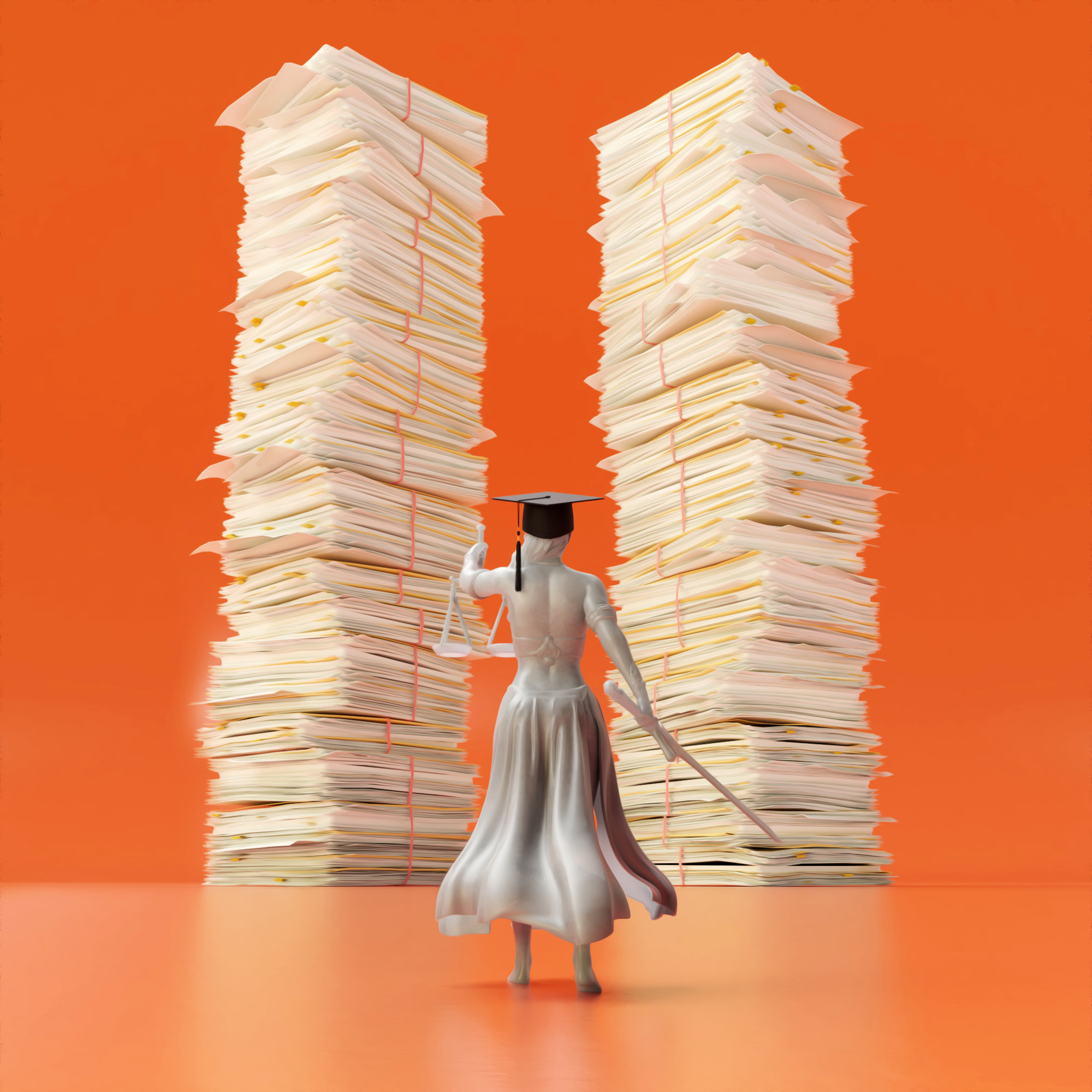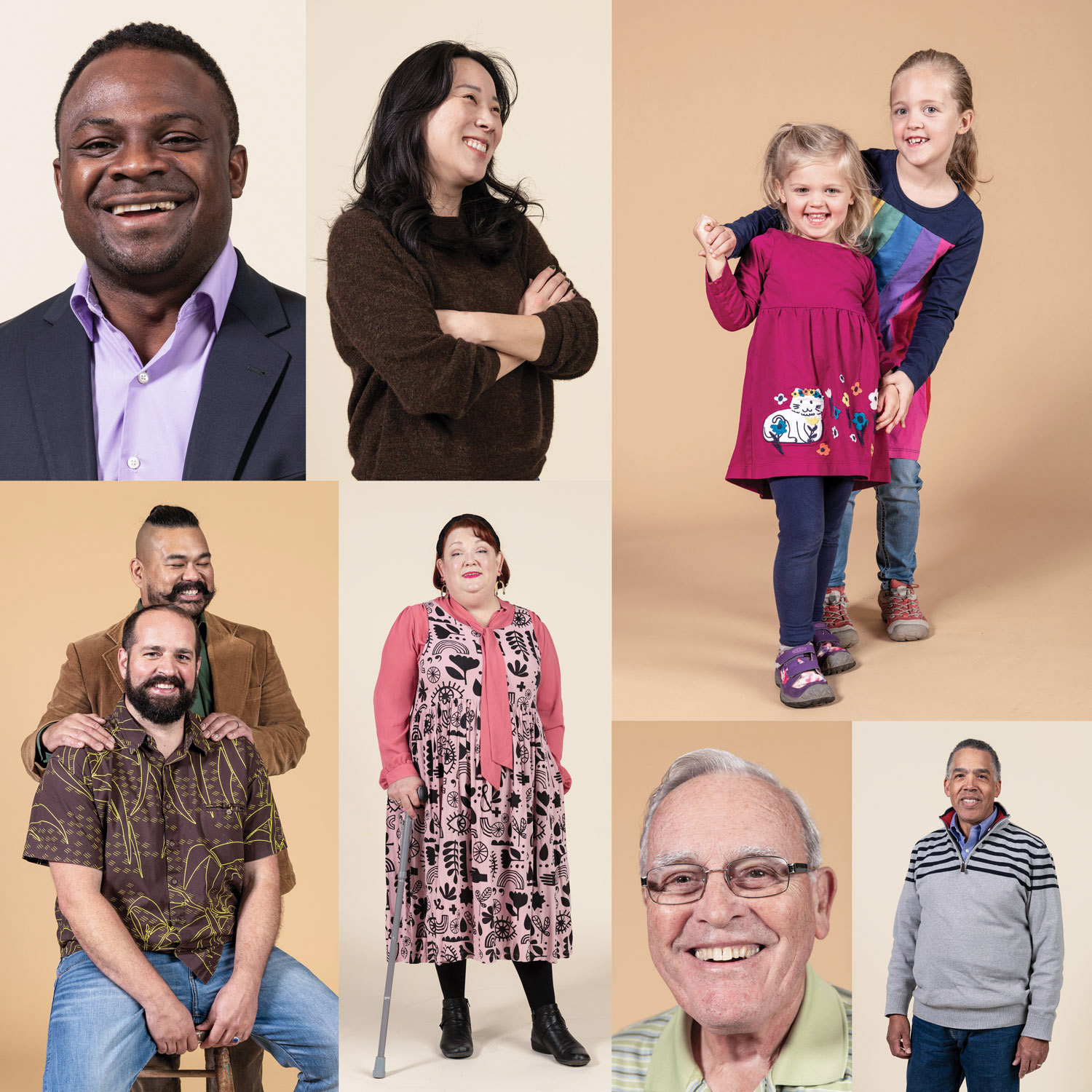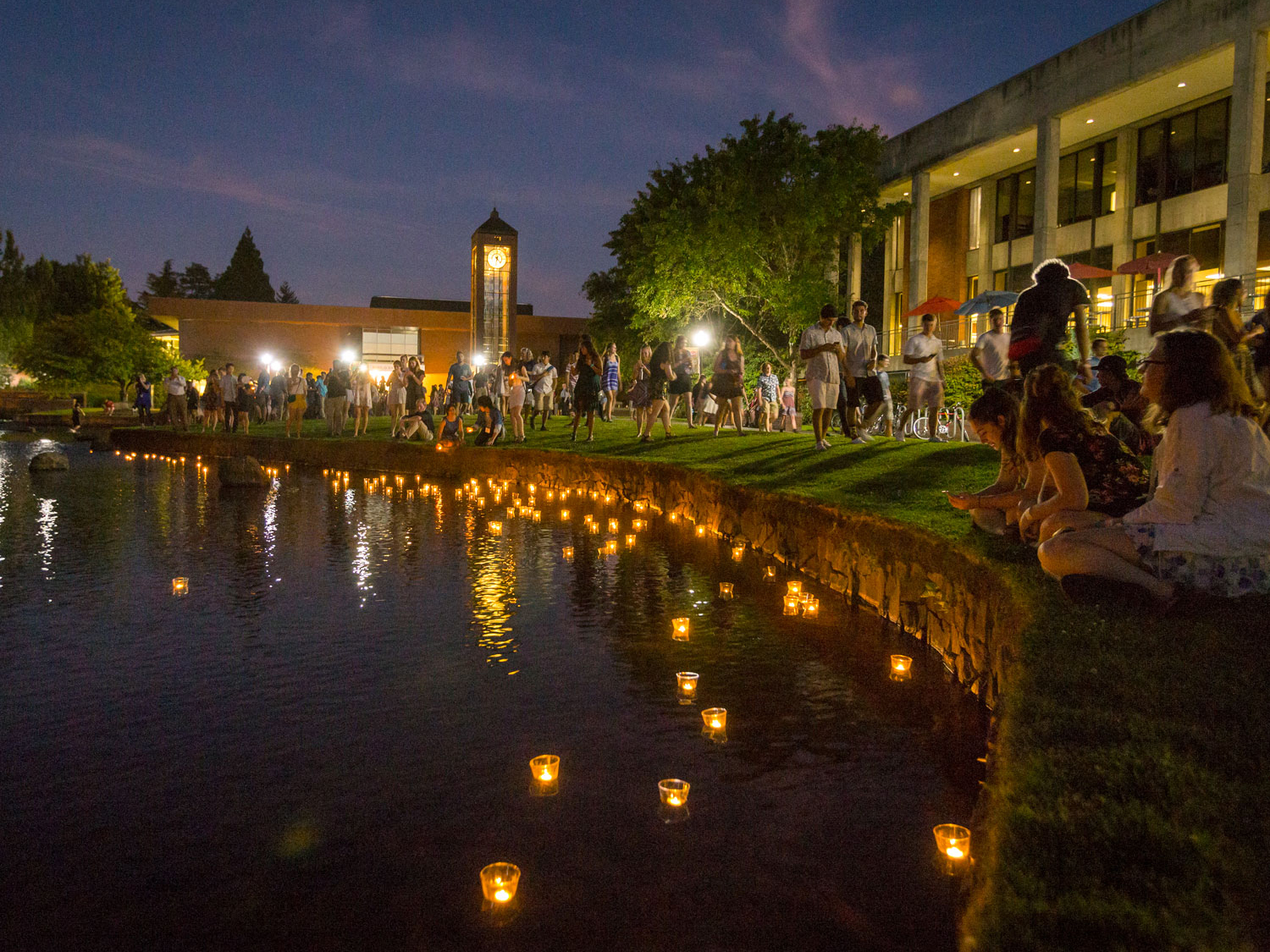F
For a moment, step back into the spring of 2020, when “everything was up in the air,” says Julie Preciado, JD’20. She and her classmates at Willamette Law were in the final weeks of their law school education. Preciado had clients she was representing at the school’s business clinic, and a job as a law clerk at the U.S. Attorney’s office in Portland. Within a matter of days, her entire law school experience was online, including graduation.
“I ended up having one law school friend come over and we did a little pretend ceremony outside, socially distant, where we walked across my driveway,” Preciado says.
At the time, no one knew how aspiring lawyers could safely take the bar exam, typically held over two days in late July, and in the company of hundreds of other people. For many lawyers, studying for the exam is an intense but mandatory rite of passage in the months after completing law school. But pile on a pandemic, and for the law class of 2020, the period after graduation proved an especially uncertain initiation to a legal career.
“We had to finish up law school at home, scared of the virus, scared to go out, not knowing what was going to happen,” Preciado says. “And those of us that had just graduated, without the ceremony, had to start prepping for the bar exam.”
What happened next, though, marked the beginning of a major shift in how Willamette Law will teach future lawyers, one that positions the school as a leader in what many experts say is a long-overdue national reckoning with the bar exam.
Most people need a lawyer at some point in their lives, whether it’s when buying a house, filing for divorce, writing a will, or settling business or personal disputes. And for anyone accused of a crime, a lawyer ensures their constitutional right to representation. To find a good lawyer, people often ask friends and family, or seek out a referral from a local bar association. They may check whether their lawyer has expertise in a particular subject matter, or whether they’ve been disciplined by a state licensing agency. One thing they’re unlikely to do, though, is ask how their lawyer scored on the bar exam.
For much of the profession’s history in the United States, becoming a lawyer did not require formal schooling. Few states had requirements that lawyers pass an exam—aspiring attorneys often studied the law as apprentices with practicing lawyers. Law school education began to formalize in the 1870s, along with other professions like medicine, engineering, and journalism. To attract students, law schools promised what was known as “diploma privilege,” the right to practice law on completion of a law school education at an accredited school. The move toward formal examinations and licensure standardized the practice of law, often to the benefit of consumers by improving the quality and competency of the profession.
But formalization also served as gatekeeping. As more Black lawyers began attending law schools, for example, their white counterparts found ways to exclude them. Some states began requiring that prospective lawyers graduate from schools accredited by the American Bar Association, even though, starting in 1912, the ABA explicitly barred Black lawyers from membership. In 1925, Black attorneys formed their own organization, the National Bar Association, and it was not until 1950 that the ABA admitted Black lawyers for membership.
Even today, the legal profession does not reflect the racial or ethnic makeup of the nation. Practices rooted in the white supremacy of the nation’s founding linger in the law, particularly in the criminal court system. Judges and prosecutors are more likely than the general population to be white, as are the defense lawyers who represent criminal defendants—even as a disproportionate number of the people who face charges or incarceration are Black. Many people who need lawyers for criminal and civil matters may not be able to find one who understands their language or cultural background.
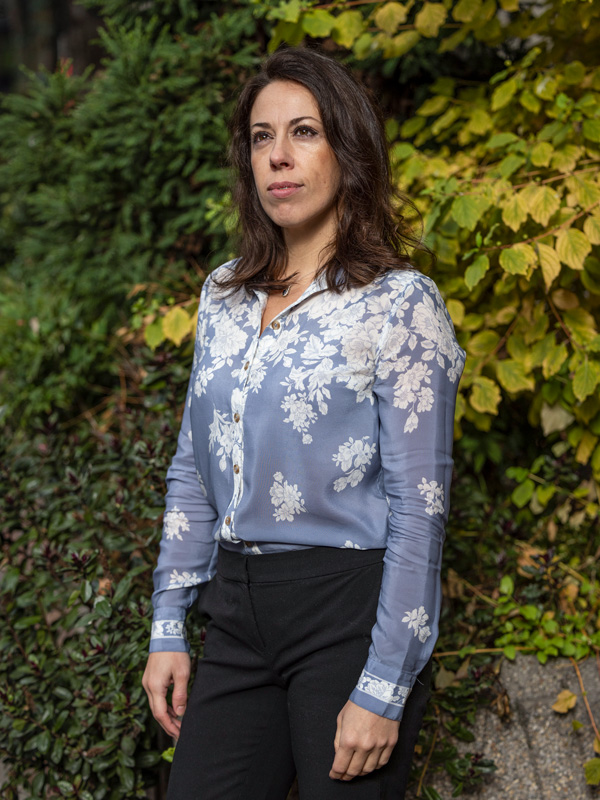
Today, each state administers its own bar exam and determines what qualifies as a passing score on it. Most jurisdictions, including Oregon, have adopted the “Uniform Bar Exam,” a test given nationwide regardless of which state the test-taker is in. The UBE tests broad swaths of the general knowledge base necessary to be a lawyer: contracts, constitutional law, criminal law and procedure, evidence, real property, torts, and civil procedure.
What it means to pass the UBE is not uniform, though. As Willamette Law Dean Brian Gallini points out, Oregon has set the passing score on the UBE at 270, while New York’s passing score is 266. This means those who score 268 have failed in Oregon, but they can “port” their score to New York in order to register a passage on the exam. Another problem is in the questions themselves. Many argue they are riddled with biases that may prevent smart, talented people from becoming lawyers. In 2021, the American Bar Association for the first time released statistics that broke down bar exam passage rates by race. It showed that during the 2020 bar exams, white test-takers across the nation were far more likely to pass than test-takers of other races. It was the first time such statistics—broken down by race—were shared by the National Conference of Bar Examiners, and it exposed an ugly truth about who passes the exam. Law schools took notice nationwide.
Some critics have called the bar exam a “test of resources” that benefits those who can afford preparatory classes and the time to take them. Surveys suggest that those who studied more than forty hours per week were much more likely to pass, as were those who paid for bar exam preparation courses. At a disadvantage are those who work full-time while studying for the exam and who do not have forty hours each week to study.
“It’s healthy to re-examine these things from time to time,” Gallini says. “And this is an exam that has largely gone without reform for the better part of a hundred years that we’ve been administering it.”
Beyond its exclusionary history, though, the bar exam may not actually measure what it takes to be a good lawyer. As a 2020 op-ed in the San Diego Union-Tribune pointed out, some of what’s tested on the California bar exam is not even part of state law. And in the words of an October 2020 report by the Institute for the Advancement of the American Legal System: “The unfortunate reality is that, although the bar exam has existed for more than a century, there has never been an agreed-upon, evidence-based definition of minimum competence. Absent such a definition, it is impossible to know whether the bar exam is a valid measure of the minimum competence needed to practice law or an artificial barrier to entry.”
The death of George Floyd only amplified long-standing concerns about equity within the legal profession. His killing in May 2020 by a Minneapolis police officer sparked nationwide racial justice protests that led many institutions, including law schools, to examine their role in perpetuating unjust systems. Willamette was among them. At Willamette, law students formed a task force to examine systemic racism within the Oregon legal system.
These students looked at how jury selection in Oregon might reflect what’s known as implicit bias, which is when people—sometimes even those with the best of intentions—inadvertently bring stereotypes to their actions or decisions. Specifically, the students explored how implicit bias may affect outcomes in jury trials, particularly with the use of the peremptory challenge, a tool used by attorneys during jury selection to strike jurors from a panel without having to state a reason.
And here, we come back to the pandemic. The very reason these law students were able to work on the task force is that they did not need to spend their time studying for the bar exam. In June 2020, the Oregon Supreme Court voted to give graduates of the state’s three law schools what’s known as emergency diploma privilege. New graduates poised to take the bar exam were allowed to begin practicing law in Oregon without taking the test. (As with all aspiring lawyers, they had to pass an ethics exam and a background check.) Three other states—Louisiana, Utah, and Washington—as well as Washington, D.C., also granted diploma privilege to many of their law school graduates in 2020, and Wisconsin has long granted it.
In Oregon, 234 aspiring lawyers sought diploma privilege that summer. Preciado was among them. So was Eden Vasquez JD’20, now a lawyer at Miller Nash in Portland, and one of the leaders of Willamette’s Racial Justice Task Force. Ever since then, Vasquez has been thinking about how to test someone’s readiness to be an attorney. She can see how future students might use their time at law school to prove their qualifications to practice law, including by doing the type of research she did on the task force.
It’s “a mindset shift,” adds Preciado. “These grads don’t necessarily have to spend three months studying for a bar exam that so many people have criticized for being exclusionary. All of that had already been floating around, but we were able to say, ‘Hey, at least on an emergency basis, this is possible.’ We showed that grads have a lot to offer and could actually really start putting their skills to good use more immediately.”
The Bar exam has gone without reform for a century. And the fact is, it may not measure what it takes to be a good lawyer.
The Oregon Supreme Court took notice. In September 2020, Oregon Chief Justice Martha Walters asked a task force to consider how the state’s law schools could implement curriculum that offers pathways to licensure aside from the bar exam. And in January 2022, the court gave conceptual approval to two new ways law school graduates could become licensed attorneys in the state. One is called the Oregon Experiential Pathway. The other is known as the Supervised Practice Pathway. Both remove the requirement of the bar exam.
If the state Supreme Court approves these new pathways—which most observers expect it to do—students entering Willamette Law will be able to choose the Oregon Experiential Pathway in their second year of law school. This could happen as early as 2023, for the class of 2026. The first year of school will remain largely the same as before, but in their second and third years, students on this pathway would work on an experiential capstone project and then submit it for approval to the Oregon Board of Bar Examiners. That capstone project would be on the same level as the work Willamette students with diploma privilege undertook on the Racial Justice Task Force in 2020 when they examined implicit bias in juries.
In fact, diploma privilege, although temporary in Oregon just for 2020, has been an important selling point for alternative pathways, in part because it drew attention to what students might do instead of taking the bar to become licensed lawyers. The work completed by the Willamette students on the Racial Justice Task Force showed how law school students can make meaningful contributions to the profession. And as they worked together, the students on the task force built their own skills in collaborative research, conflict resolution, and leadership—“in other words,” says Gallini, “the kinds of skills that employers would expect from newly licensed lawyers.”
Gallini announced in January 2022 that the law school will hire new faculty members to expand the University’s experiential offerings. “For Willamette, we are already a law school and a faculty that’s heavily invested in skills-based learning,” he says. “So we aspire to be the Pacific Northwest’s leading experiential law school already, and the fact that the bar-reform conversations are moving in this direction just is a natural fit for our vision.”
The experiential pathway is “a fantastic opportunity for Willamette to showcase what great stuff it already has, but also put it on the map for being innovative and taking the time to try and create more equity within our licensing world,” says Nancy Schierhorn JD’86, chair of the College of Law Leadership Cabinet, as well as executive vice president and chief development officer for the Bristol Bay Native Corporation in Alaska.
The second alternative, the Supervised Practice Pathway, is aimed at law school graduates from outside of Oregon who want to practice here. Instead of taking the bar exam, they would pursue 1,000 to 1,500 hours of supervised legal practice to gain licensure after graduation.
And the bar exam will remain an option for Willamette Law students, too, especially for those who aim to practice in states that do not have alternative licensure. Many will likely continue to take the exam. Vasquez and Preciado, in fact, both took and passed bar exams in other states. Preciado, now an attorney at Dunn Carney in Portland, chose California. Vasquez sat for the Washington bar exam.
Both point out that there’s also a financial equity issue at the heart of the bar exam. For Willamette Law alumni in the class of 2021 who incurred law school debt, the average amount of the debt is $148,177. On top of that, Gallini says, many students have to pay for a bar review course as well as defer income until they begin jobs as lawyers in the fall. While Gallini points out that working while studying for the bar is one predictor for failing the bar exam, many students nationwide have no choice but to do so.
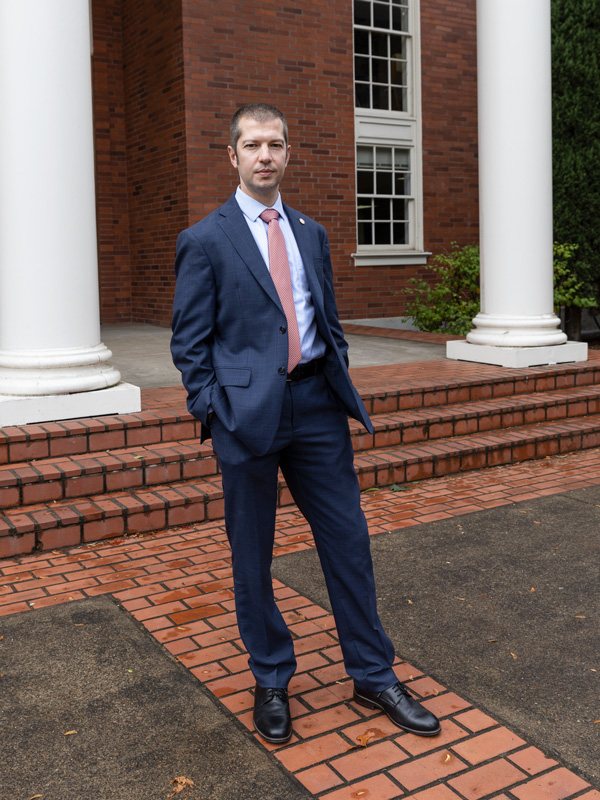
Studying for the exam is a stressful period for many aspiring lawyers, says Lucy Jensen JD’13, MBA’13, principal legal counsel at the Utah solar company Sunrun and a member of Willamette’s Law Leadership Cabinet. “There’s a lot of pressure there. And I do have concerns about the mental and emotional health and wellbeing that people go through during that time,” she says. “This could open the doors for individuals who may have been intimidated or were off put by having to take a big test. People sometimes are not great test takers, and that is not indicative of how they perform in their profession. I think this could open the door to encourage and invite other individuals who typically would not pursue a legal career.”
Gallini recently emailed 6,000 law alumni outlining the university’s support for the state’s alternative licensure plan. Since then, he has had hundreds of conversations with alumni. Jensen says that for some alumni, there was an initial reaction to oppose any changes, simply because they suffered through the bar exam and believe that future lawyers must experience the test as a rite of passage too.
“The gut response was: ‘Wait a second. This is the way it’s done. This is the way it has been done. And if you don’t do it, you’re not a real lawyer,’” Jensen says. “Once you start talking to people more and explaining all the good that can arise from it—not just for the law students, but for the legal profession as a whole and whom they serve—I think, more often than not, their minds change and they get on board. It’s a modernization that needs to happen.”
For aspiring lawyers—or anyone who needs an attorney—it’s about time.
••
Erika Bolstad is a journalist in Portland and the author of Windfall, out in January 2023 from Sourcebooks.

